Ethiopia is like a treasure trove, brimming with a mix of culture, history, and natural beauty you won't find anywhere else. Whether you're a history buff, a nature enthusiast, or someone who loves to explore diverse cultures, Ethiopia has something for everyone.
The country's rich tapestry of traditions and its stunning landscapes leave a lasting impression on both the heart and mind. From UNESCO World Heritage sites that date back to antiquity to bustling marketplaces where the nation's heritage comes alive, there's no shortage of wonders to be found in Ethiopia.
Historical Significance
Ethiopia's historical significance is nothing short of remarkable. This ancient land, often referred to as the birthplace of humanity, is where some of the earliest human ancestors were discovered. Fossils like the famous 'Lucy,' a 3.2-million-year-old Australopithecus afarensis skeleton, were unearthed here in the Afar region. These incredible findings have given us priceless insights into human evolution.
Zooming forward a few millennia, Ethiopia also boasts an unparalleled religious and cultural heritage. It's one of the oldest Christian nations in the world, and its Christian history is reflected in iconic landmarks like the rock-hewn churches of Lalibela. These eleven monolithic churches, carved directly into the rock, were constructed during the 12th and 13th centuries by King Lalibela and remain in use today. Recognized as a UNESCO World Heritage Site, these awe-inspiring structures attract pilgrims and tourists alike.
The city of Axum, situated in northern Ethiopia, holds monumental importance as well. It was the center of the powerful Axumite Empire, one of the great civilizations of the ancient world. The giant obelisks or stelae of Axum, some reaching over 24 meters in height, are remnants of a sophisticated society with advanced engineering prowess. Axum is also believed to be the final resting place of the Ark of the Covenant, a sacred object in both Judaism and Christianity. Whether one believes in the legends or not, the city remains a focal point for historical and religious scholars.
Another key chapter in Ethiopia's storied past is its resistance to colonialism. Unlike many other African nations, Ethiopia fiercely defended its sovereignty against Italian invasion during the Battle of Adwa in 1896. This stunning victory, led by Emperor Menelik II, resonated throughout the continent and beyond, serving as a beacon of hope and resistance against colonial rule. Emperor Haile Selassie also played a crucial role on the world stage, promoting pan-African unity and becoming a symbolic figure for global movements such as Rastafarianism.
According to historian Paul B. Henze, "Ethiopia’s unique historical and cultural heritage should be appreciated as an integral part of the heritage of all humanity."
“It is in Ethiopia that the concept of African unity was ignited, and this legacy of independence and dignity still permeates through the veins of this incredible nation.”From ancient kingdoms to heroic battles, Ethiopia's historical landscape is a mosaic of monumental events and achievements. This makes it a fascinating destination for anyone keen on history and heritage.
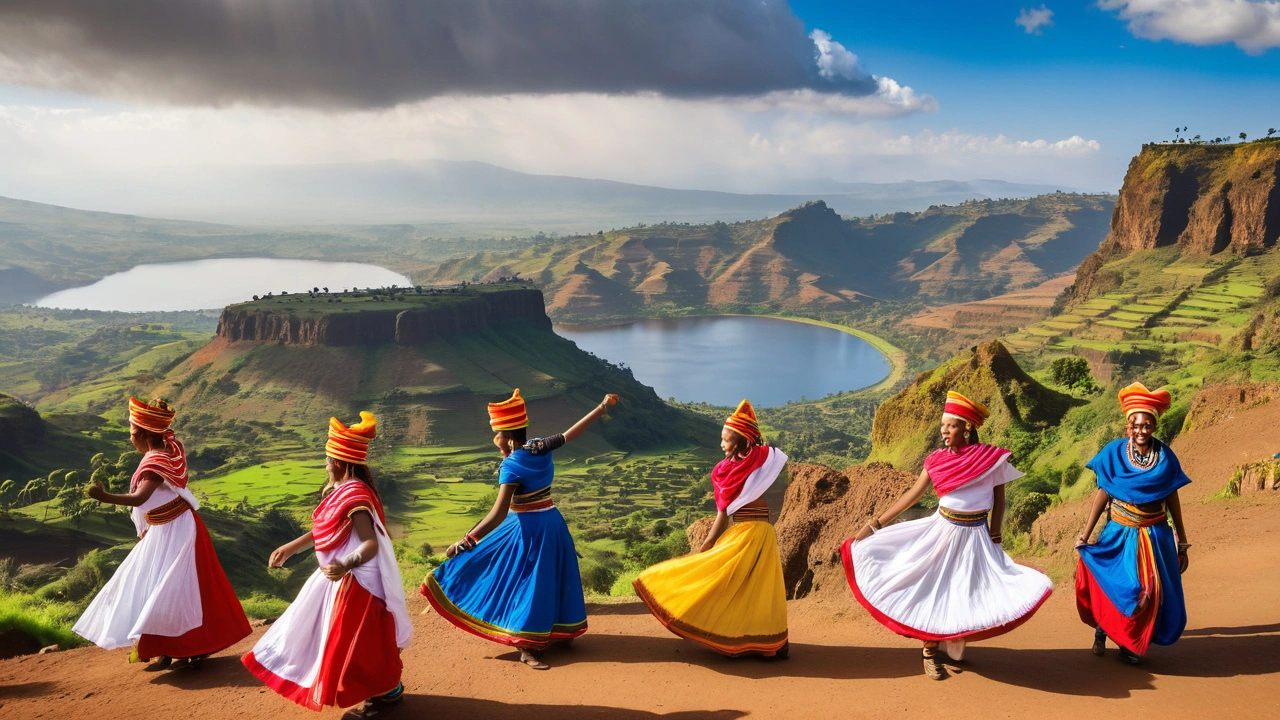
Cultural Diversity
When it comes to cultural diversity, Ethiopia stands out with remarkable depth and vibrancy. It's a country that houses more than 80 distinct ethnic groups, each with its own language, traditions, and customs. This incredible variety makes Ethiopia one of the most culturally rich countries in Africa, if not the world.
One of the key elements that showcase this diversity is language. Ethiopia's linguistic landscape is as varied as it gets. Amharic is the official working language, but you'll hear Oromo, Tigrinya, Somali, and many other languages being spoken in different regions. This multilingualism doesn't just make for an interesting travel experience; it tells a story of a country where history and tradition are alive in daily communication.
Traditional music and dance also play a significant role in the cultural fabric of Ethiopia. Each ethnic group has its unique musical styles and dance forms, often used in ceremonies, festivals, and community gatherings. For instance, the Eskista dance, characterized by rapid shoulder movements, is a captivating sight that reflects Ethiopian folks' exuberant spirit.
Food is another splendid gateway into understanding Ethiopian culture. The nation's cuisine is as diverse as its people. The iconic injera, a sourdough flatbread made from teff flour, is a staple in Ethiopian meals. It serves as both a plate and an edible utensil, often accompanied by an array of wats or stews. The communal way of eating—sharing meals from a single platter—emphasizes the Ethiopian values of community and togetherness.
Ethiopia's orthodox Christianity and Islam also add layers to its cultural identity. The country is home to some of the oldest Christian communities in the world. The rock-hewn churches of Lalibela, carved out of solid rock in the 12th century, are a testament to the country's deep religious roots. During religious festivals like Timkat or Meskel, the streets come alive with processions, chanting, and colorful attire, giving travelers a peek into Ethiopia's devout traditions.
Interestingly, Ethiopia has never been colonized, a unique factor that has allowed it to maintain its cultural heritage without foreign influence. This autonomy has enabled the preservation of practices, festivals, and ways of life that might have otherwise been diluted or lost. As a result, visitors can experience an authentic terroir that's genuinely Ethiopian.
"The cultural diversity of Ethiopia is a testimony to its rich history and the resilience of its people," according to cultural historian Richard Pankhurst.
Handicrafts also add to the vivid tapestry of Ethiopian culture. From intricate basket weaving to pottery, each craft reflects the skills passed down through generations. Markets like Addis Mercato offer a feast for the eyes with colorful textiles, traditional clothing, and handmade jewelry. Purchasing these items doesn't merely serve as a souvenir; it supports local artisans keeping their heritage alive.
In recent years, the Ethiopian government and various NGOs have invested in promoting its rich cultural heritage as a way to foster unity and economic growth. This includes cultural festivals, heritage tours, and educational programs aimed at preserving the languages and traditions of the numerous ethnic groups. Such efforts are essential in a modernizing world where cultural identities can easily erode.
If you ever find yourself wandering the roads of Ethiopia, take in the diversity that surrounds you. The people you meet, the languages you hear, and the customs you witness are pieces of a grand mosaic that is Ethiopia. It's a nation where the past and present beautifully coalesce, offering a kaleidoscope of experiences you won't forget.
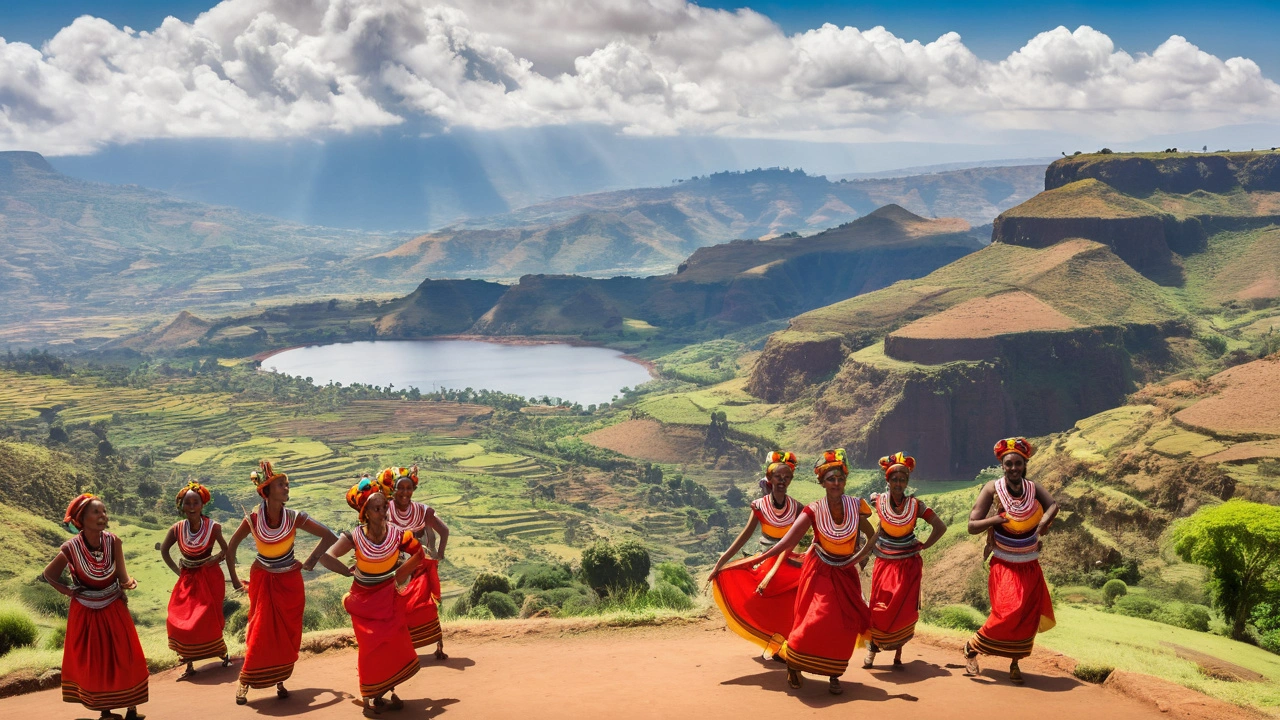
Natural Beauty
Ethiopia is a land where the landscape is as diverse as it is breathtaking. Picture this: lush green highlands that roll effortlessly into dramatic terrains and arid deserts. One of the most striking features of this country is the Ethiopian Highlands, often referred to as the Roof of Africa. This mountainous region is not only the source of the Blue Nile but also home to the Simien Mountains National Park, a UNESCO World Heritage Site. The park features rugged peaks, deep valleys, and sharp precipices.
Besides the highlands, Ethiopia boasts a myriad of unique ecosystems. The Great Rift Valley, for instance, is a geological wonder that runs through the country, offering a complex mix of terrains from volcanic hot springs to fertile green lands. This valley is dotted with a series of lakes, each with its own unique character. Lake Tana, the largest lake in Ethiopia, is a significant source of the Blue Nile and surrounded by ancient monasteries. Wildlife enthusiasts would be thrilled to visit the Awash National Park and Bale Mountains National Park, home to some endemic species like the Ethiopian wolf and the Gelada baboon.
The Danakil Depression stands out as one of the most extreme landscapes on Earth. This below-sea-level desert basin is among the hottest inhabited places on the planet. Despite its harsh conditions, it’s a riot of colors due to sulfur springs and salt flats. Adventurers who brave the challenges of this region are treated to a visual spectacle seldom seen elsewhere. Adding to its allure, the Erta Ale volcano, with its continuously active lava lake, is a must-visit for thrill-seekers.
An unexpected delight is the lush, fertile green summer where coffee was first discovered. The forests of Kaffa and Bonga are the legendary birthplaces of this globally cherished beverage. Walking through these forests, you might imagine Kaldi, the goat herder from Ethiopian lore, witnessing his goats dance around after munching on coffee beans. Today, coffee continues to be a vital part of Ethiopian culture and economy, with traditional coffee ceremonies being a staple social activity.
Another breathtaking sight is the Sof Omar Cave, which stands as one of the longest cave systems in Africa. This natural marvel, formed by the Web River, offers a limestone maze stretching over 15 kilometers. Visitors are captivated by its chambers, pillars, and impressive passages, making it a spelunker's dream.
“Ethiopia’s geography reads like a natural history textbook, stretching from the depths of the Danakil Depression—a geological wonder—to the towering heights of the Simien Mountains,” states Dr. Jane Goodall, noted primatologist.
For anyone with a sense of adventure and a love for nature, Ethiopia offers an unending array of awe-inspiring landscapes. It's a place where the beauty of the natural world is interwoven with rich cultural heritage, offering a truly unique experience for all who visit.
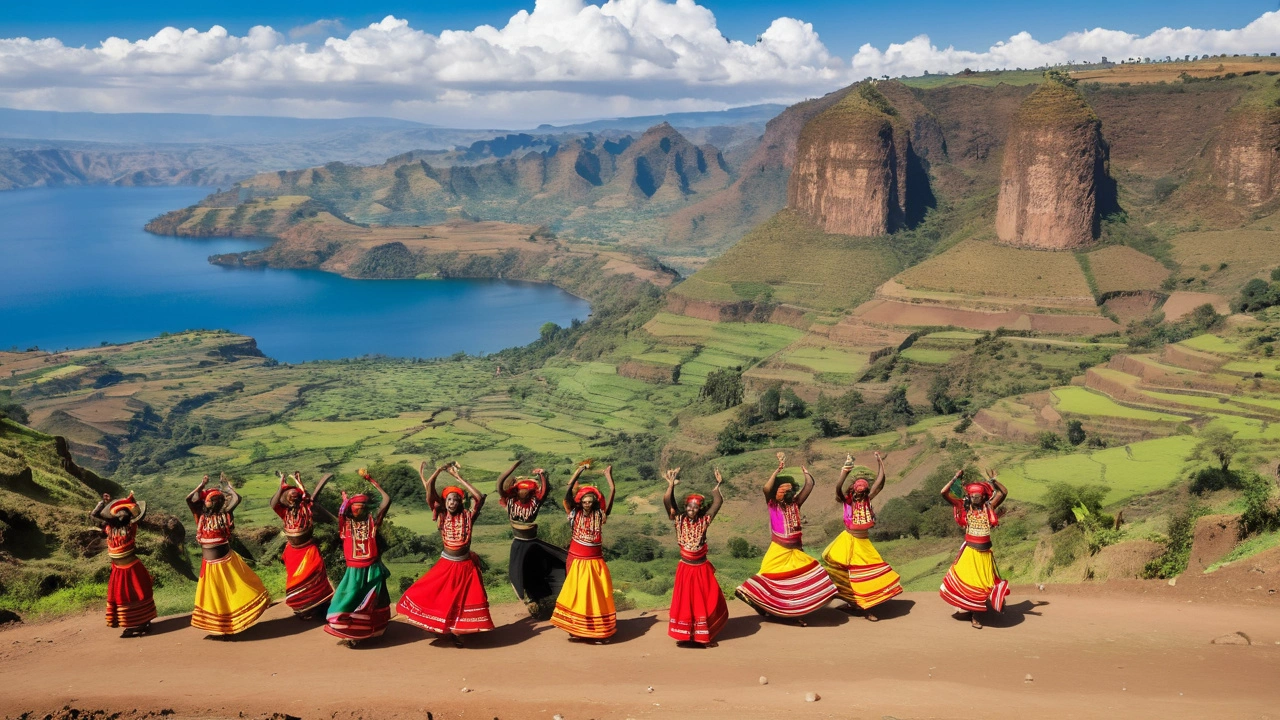
Economic Resources
Ethiopia's economic landscape is as diverse and vibrant as its cultural one. Known for being the birthplace of coffee, Ethiopia's coffee industry plays a crucial role in its economy. With vast plantations spread across the highlands, Ethiopian coffee is considered among the best in the world. Coffee isn't just a product here; it's a part of everyday life and a source of national pride. Farmers in regions like Sidamo and Yirgacheffe grow some of the most distinguished varieties that are celebrated globally for their rich flavor profiles and aromatic depth. A significant portion of the country's foreign exchange earnings comes from coffee exports, making it a backbone of the Ethiopian economy.
Apart from coffee, Ethiopia's agriculture forms the bedrock of its economy. The country is a major producer of various crops such as teff, wheat, barley, and sorghum. Teff, in particular, is notable as it is the main ingredient in injera, the traditional Ethiopian flatbread. Smallholder farms dominate the agricultural sector and employ a large part of the population. Recently, the government has been investing in modernizing agriculture to boost productivity and secure food supply. These efforts include improving irrigation systems, offering better access to finance for farmers, and adopting new farming techniques.
Gold is another significant player in Ethiopia's economic resources. The country has substantial reserves of gold, and mining activities are ramping up to tap into these riches. The largest gold mines are located in the Oromia and Tigray regions, where both small-scale artisanal miners and large-scale companies operate. Gold exports have been a key source of revenue, and the government has set ambitious goals to expand this sector, aiming to attract more foreign investment and ensure sustainable mining practices.
In addition to gold, Ethiopia is rich in other minerals like tantalum, potash, and gemstones. For instance, the precious opal found in Ethiopia is highly valued in the global market. These minerals contribute to the diversification of the economy and represent a potential for future development. The mining sector holds promise for job creation and economic growth, though it also faces challenges such as regulatory hurdles and environmental concerns.
"Ethiopia is poised for significant growth in its mining sector, which could become a major pillar of its economy," says Dr. Daniel Tesfaye, a noted Ethiopian economist. "Strategic investments and proper regulations are crucial to harnessing this potential sustainably."
Tourism is another resource that contributes significantly to Ethiopia's economy. The country's rich historical and cultural heritage, combined with its breathtaking landscapes, attracts tourists from around the globe. Sites like Lalibela's rock-hewn churches, Aksum's ancient obelisks, and the Simien Mountains are just a few of the unique attractions. The vibrant festivals and traditional ceremonies also provide a unique experience for visitors. The government has been focusing on improving infrastructure and promoting Ethiopia as a top tourist destination to further boost this sector.
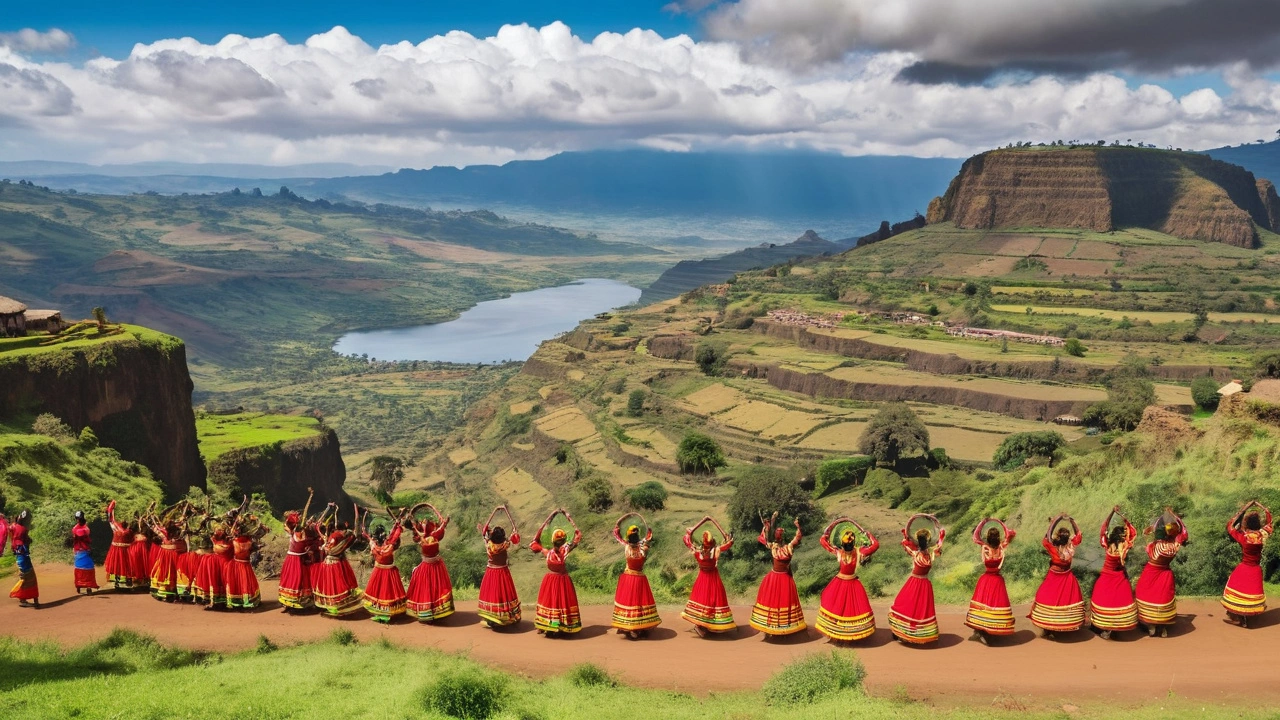
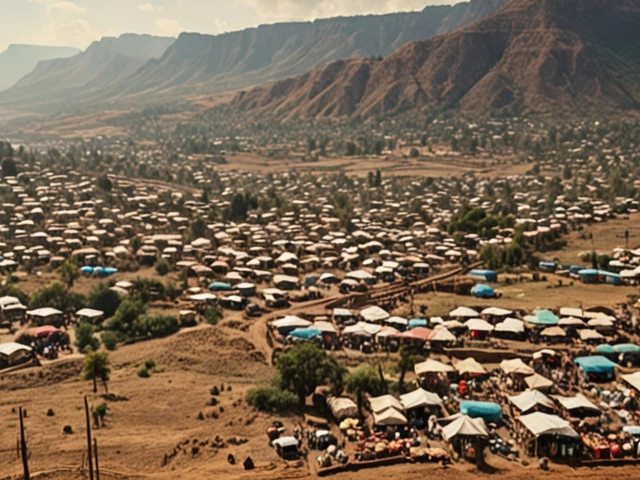 Is Ethiopia a Wealthy Nation or Struggling with Poverty?
Is Ethiopia a Wealthy Nation or Struggling with Poverty?
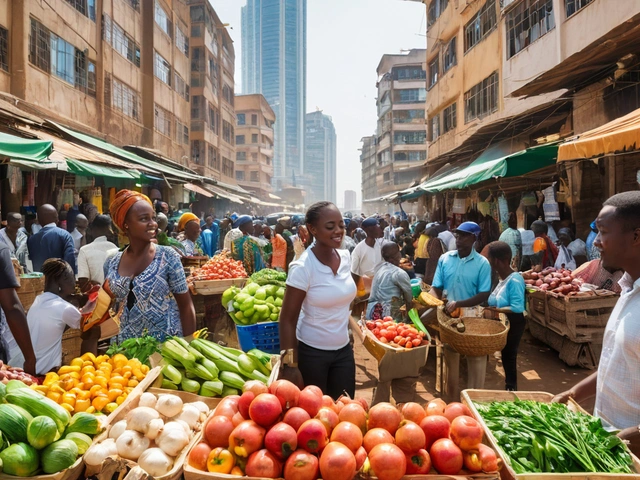 Business Sectors Thriving in Africa: Key Opportunities to Explore
Business Sectors Thriving in Africa: Key Opportunities to Explore
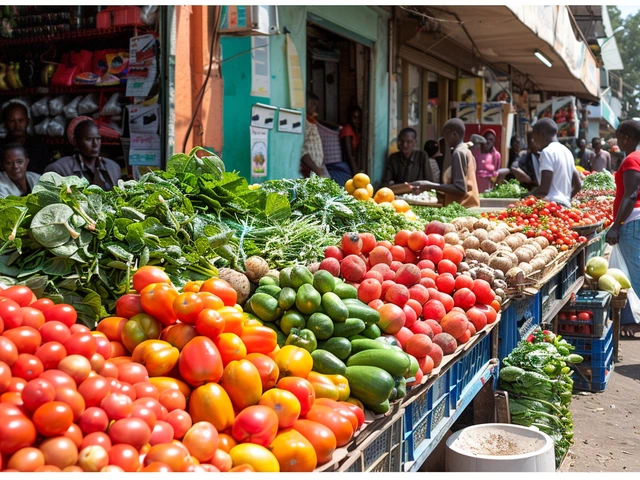 Cost of Living in Ethiopia 2024: Expenses for a Comfortable Lifestyle
Cost of Living in Ethiopia 2024: Expenses for a Comfortable Lifestyle
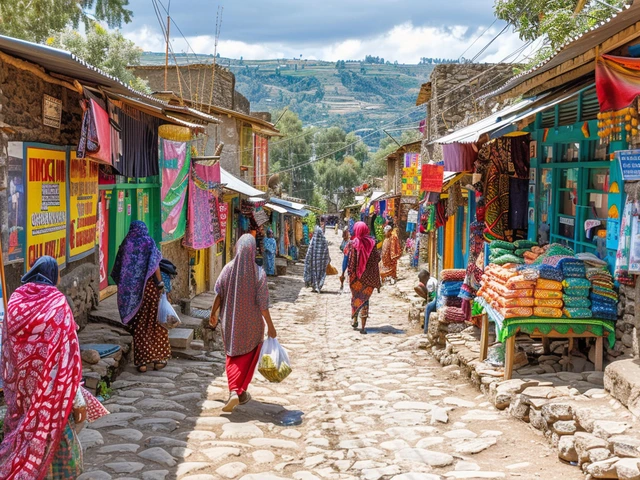 Unpacking the High Cost of Living in Ethiopia: Insights and Explanations
Unpacking the High Cost of Living in Ethiopia: Insights and Explanations
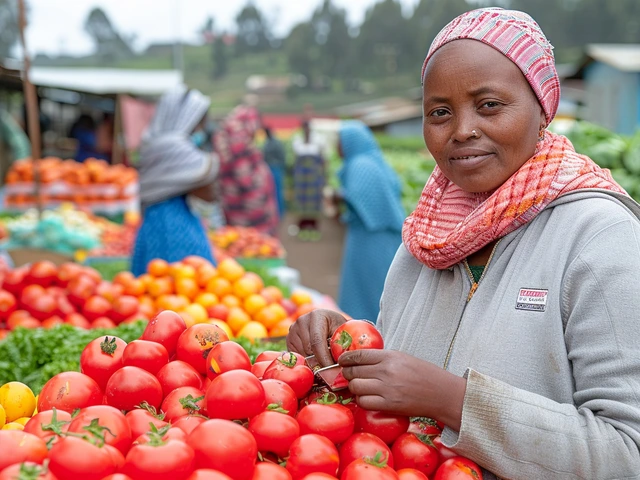 Understanding Wage Rates in Ethiopia: What You Need to Know
Understanding Wage Rates in Ethiopia: What You Need to Know
Christopher Boles
July 25, 2024 AT 17:39Ethiopia really is a place where the past and present sit side by side, and anyone who loves learning will find something to marvel at. The mix of ancient churches, vibrant markets, and breathtaking mountains makes it feel like a living museum. If you ever get the chance, take the time to explore the local festivals – the music and dance are infectious. And don’t forget to try the injera with a variety of wats; it’s a delicious way to experience the culture. You’ll leave with a deeper appreciation for how diverse the world can be.
Crystal Novotny
July 29, 2024 AT 04:59Honestly the piece sounds like a travel brochure missing the gritty reality of modern Ethiopia
Reagan Traphagen
August 1, 2024 AT 16:19What most people fail to see is how Western tourism is turning these sacred sites into cash‑cows, eroding authentic traditions. The influx of foreign capital fuels a hidden agenda of cultural commodification, and we’re just cheering for it. Meanwhile, local communities are forced to sell their heritage for a few dollars and watch their ancient practices become stage props. It’s a moral crisis that the article glosses over with pretty pictures.
mark sweeney
August 5, 2024 AT 03:39i dunno, maybe youre overthinking it. tourism can bring jobs and modernization, not alwys oppresion. sure, keep an eye on excess but dont dismiss the positive impact.
randy mcgrath
August 8, 2024 AT 14:59The tapestry of Ethiopia’s heritage weaves together threads of humanity, geography, and resilience that few places can claim. From the fossilized whispers of Lucy in the Afar desert, we glimpse the very roots of our species, reminding us that the story of man began on this continent. The monolithic churches of Lalibela stand not just as architectural marvels but as testaments to collective faith, dedication, and the power of vision. Axum’s towering stelae echo the engineering prowess of an empire that once connected Africa to the Red Sea trade routes. When you walk through the bustling alleys of Addis Mercato, you hear a chorus of languages-Amharic, Oromo, Tigrinya-each syllable a living link to centuries of oral tradition. The rhythmic shoulder movements of the Eskista dance embody a joyous defiance that has survived colonization attempts and modern pressures alike. Coffee, cultivated in the misty highlands of Kaffa, offers more than a caffeine kick; it provides a ritual of hospitality, a ceremony that binds families and strangers in shared conversation. The Simien Mountains challenge the body and spirit, their jagged peaks serving as a reminder that the natural world still holds untamed majesty. Meanwhile, the Danakil Depression, with its acidic pools and shifting salts, proves that life can thrive in the most hostile environments, mirroring the endurance of Ethiopia’s peoples. The nation’s refusal to be colonized gave it a rare autonomy to preserve its customs, yet it now faces the paradox of opening its doors without losing its soul. Investment in mining and agriculture promises growth, but it also threatens to fracture the delicate balance between development and cultural preservation. As tourists trek to the ancient monasteries on Lake Tana’s islands, they should remember that these sanctuaries are active centers of prayer, not merely photo‑op backdrops. Ultimately, Ethiopia invites us to contemplate the interconnectedness of history, environment, and identity, urging a respect that goes beyond superficial tourism.
Frankie Mobley
August 12, 2024 AT 02:19Don’t miss the coffee ceremonies while you’re there – they’re a perfect way to see how integral coffee is to everyday life here.
ashli john
August 15, 2024 AT 13:39Totally agree, the coffee experience is like a warm hug from the culture. It’s a simple moment that says a lot about community.
Kim Chase
August 19, 2024 AT 00:59i thot it wud be cool 2 add that the coffee rituals also support small famly farms in the highlands, keepin the tradishon alive n helpin the economee.
David Werner
August 22, 2024 AT 12:19Ethiopia hides secrets the world will never understand.
Paul KEIL
August 25, 2024 AT 23:39One must acknowledge the geopolitically salient paradigm that positions Ethiopia as a nexus of carbon‑neutral agronomy intersecting with emergent fintech ecosystems.
Horace Wormely
August 29, 2024 AT 10:59There should be a comma after "emergent" and "fintech" needs a hyphen for correct compound adjective usage.
christine mae cotejo
September 1, 2024 AT 22:19Standing at the edge of the Simien cliffs, you can feel the ancient wind whispering tales of emperors and warriors, a sensation that dwarfs any postcard image. The sheer cliffs, painted in ochre and deep green, seem to guard the secrets of the Ethiopian wolf, a creature as elusive as the myths that surround it. As you descend into the valleys, the rhythm of the highland shepherds’ chants blends with the rustle of lupine fields, creating an auditory tapestry that feels both timeless and urgent. The coffee beans, still glistening with morning dew, remind you that each sip is a conduit to centuries of painstaking cultivation, a lineage that binds the farmer to the consumer across continents. Even the bustling markets of Addis Ababa pulse with a chaotic harmony, where the clamor of merchants, the aroma of spices, and the flash of traditional textiles converge into a sensory overload that is, paradoxically, soothing. You begin to realize that the economic prospects of gold mining and tourism are not merely statistics but living forces that shape families’ aspirations and anxieties. Every stone in the Axum obelisks carries an echo of ancient engineering, a silent testament to human ingenuity that resonates with the modern push for sustainable development. The Danakil Depression, with its otherworldly palette, challenges your perception of habitability, yet life persists, stubborn and resilient, much like the spirit of the Ethiopians themselves. As night falls and the sky bursts into a million stars over Lake Tana, you are humbled by the vastness of history that rests beneath your feet and the responsibility to honor it moving forward.